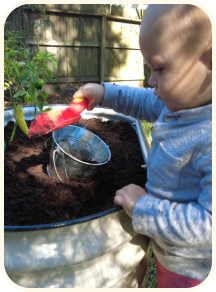Acorns Can Be Composting Gold in Your Garden
Scrat may only be a saber-toothed squirrel, but even he knew acorns can change the world.
While the Ice Age was long ago, and acorns were certainly sparse, that’s not the case today as the Houston area is experiencing a mast year. That means some species of nut-bearing trees are producing an abundance of goodies.
Here are some ways to enjoy nature’s current bounty.

Compost
“Acorns are considered ‘brown materials’ in the composting world, which refers to carbon-rich materials that help balance the composting equation,” said Vego Garden Horticulturist Sydney Fiene. “They add nutrient-rich amendments to help create a healthy garden compost.”
Brown materials are high in carbon and ideally make up 80 percent of compost.
Depending on your preferred gardening method, you may want to break the acorns down to expose the meaty middle. It can take years for acorns to naturally break down. A hammer works, or just scoop up the acorns you ran over with your car in the driveway!
“Shredding the acorns can of course speed up the decomposition,” Sydney said. “But if you use our method of layering raised beds you do not have to break them down.”
Vego Garden is a fan of the Hugelkultur method, which is the process of layering organic garden waste inside raised garden beds. Acorns can fill the gaps between compostable layers, efficiently filling a raised bed with something economical, readily available and environmentally friendly.
Grow

Did your mother ever tell you that if you swallowed a watermelon seed, you would grow a melon in your stomach? We all know that’s not true, but you can grow an oak tree from an acorn.
Collect twice as many acorns as you think you will need, because it can be hard to tell which ones will germinate after they have fallen from the tree. You’ll need a seedling tray and high-quality soil.
However you choose to put your acorns to work, your garden will thank you for it.
“Acorns contain nutrient-rich properties that can help create a healthy garden compost,” Sydney said. “By composting them at home, you actively participate in reducing greenhouse gas emissions and contribute to a sustainable waste management system.”





















